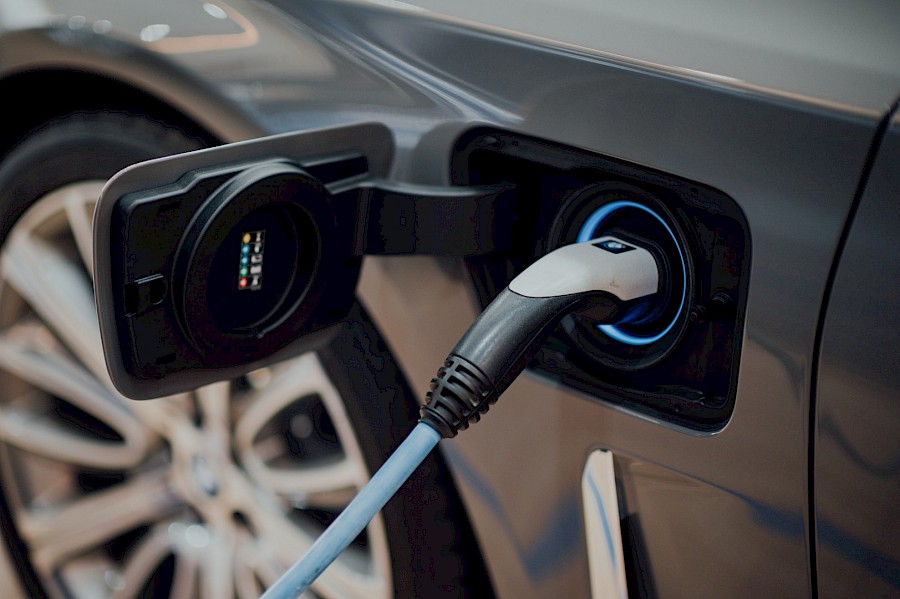Strategic innovation
and product management
As an expert service provider in the fields of safety, quality and sustainability, we are constantly working to be a preferred partner for future technologies and processes. Innovation and future viability are therefore particularly important to us, and are among our core sustainability principles. We aim to deploy our expertise to provide our partners with the best possible support in meeting the societal challenges and trends of today and tomorrow, including digital transformation, connectivity, and climate change. We are continually developing our services in this context within an increasingly disruptive market environment. This also includes the sustainability of service provision, such as with regard to resultant CO2 emissions, as well as explicitly sustainability-related services such as the auditing of greenhouse gas balances.
Innovation for
car repair
workshops
The conventional method of calibrating roller brake testers in car repair workshops is highly labor-intensive. The static test procedure, for which the test bench has to be disassembled, can take more than two hours. Our system development experts at DEKRA Automobil GmbH have now devised a method involving a dynamic calibration procedure that allows the test to be completed in 20 minutes. The newly developed calibration tool, which is the size of a hand truck, is run into the roller brake test bench and weighted down by a vehicle. The test bench is then placed under load across its entire measuring range. It is then just a matter of comparing the displayed data against the actual measurements of the calibration tool.

Crash tests with
electric vehicles
A Renault Zoe and three Nissan Leafs were crashed at the DEKRA Crash Test Center in Neumünster as part of a joint research project between DEKRA Accident Research and the Road Traffic Accident Research Department of the University Medical Center Göttingen. The collisions against a post simulated different scenarios of impact against a tree. The speeds were far above those usually applied in standard crash tests. The conclusion of the accident researchers was that the electric vehicles tested were in no way inferior to comparable conventionally powered vehicles in terms of safety. In three of the four crash scenarios, the experts had the electric vehicles collide side-on against the post – the Renault Zoe at 60 km/h, the Nissan Leaf (from 2010-2017 production) at 60 and additionally at 75 km/h. In the fourth scenario, a Nissan Leaf was crashed front-on at 84 km/h. The goal of the research project is to optimize the recovery of occupants from crashed cars.

Carbon-neutral
battery cell manufacturing
in China
As part of its sustainability partnership with Mercedes-Benz, DEKRA is helping Farasis Energy (Ganzhou) Co. Ltd. to set up a carbon-neutral battery cell manufacturing facility in China. Our sustainability experts will review and upgrade the environmental standards of the new-build battery cell plant. Other planned facilities of the Mercedes-Benz supplier in Bitterfeld-Wolfen, Germany, and in the USA will also be carbon-neutral. The DEKRA experts will carry out neutral verification of actual CO2 emissions, as well as advising the company on how to avoid them, on their energy procurement, and on carbon-neutral production at the new plants.

Safety for
sustainable
e-mobility
In order to offer our customers comprehensive services in the growing market for electric vehicles as in other fields, DEKRA is employing the Charging Discovery System (CDS) from Californian tech company Keysight. This makes it possible to comprehensively test and certify the different charging technologies in electric vehicles and charging systems. Keysight is supporting automotive and energy companies in the transition to e-mobility with design, testing and validation solutions. The Keysight solutions enable us to improve the safety of electric vehicle traffic based on highly automated testing technology, and to conduct safety, EMC and performance tests. Keysight and DEKRA are active members of the Charging Interface Initiative (CharIN), which aims to promote the establishment of a global standard for charging electric vehicles. Keysight's modular CDS test system enables us to test and evaluate charging interoperability between any electric vehicle and any charging system, and among all component elements of the charging network. By doing this, we are making an important contribution to the search for an ideal global charging standard.

